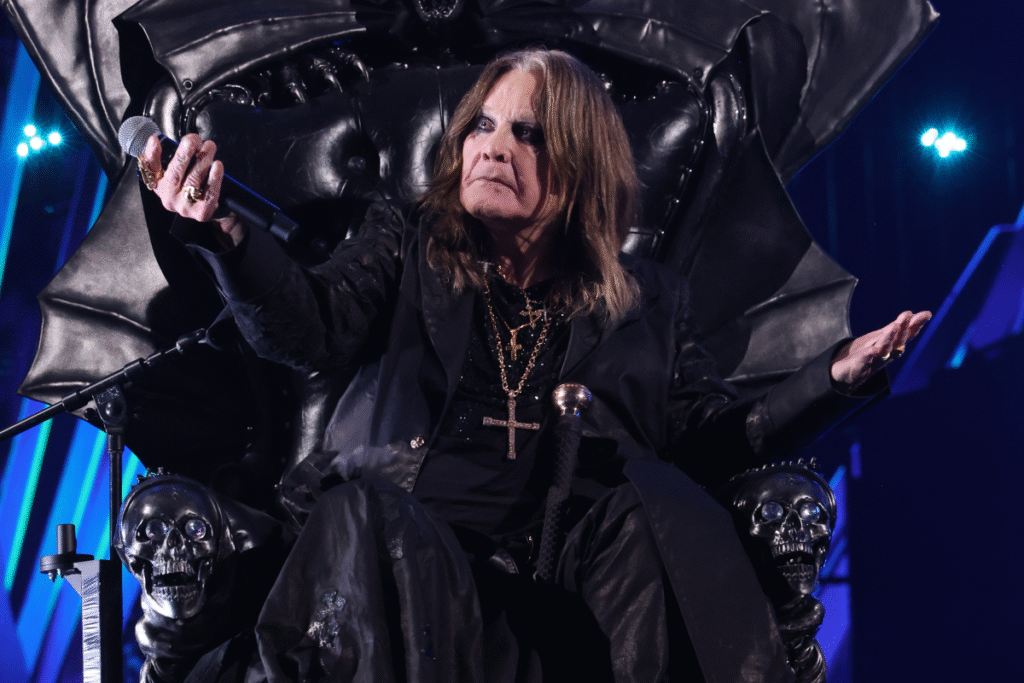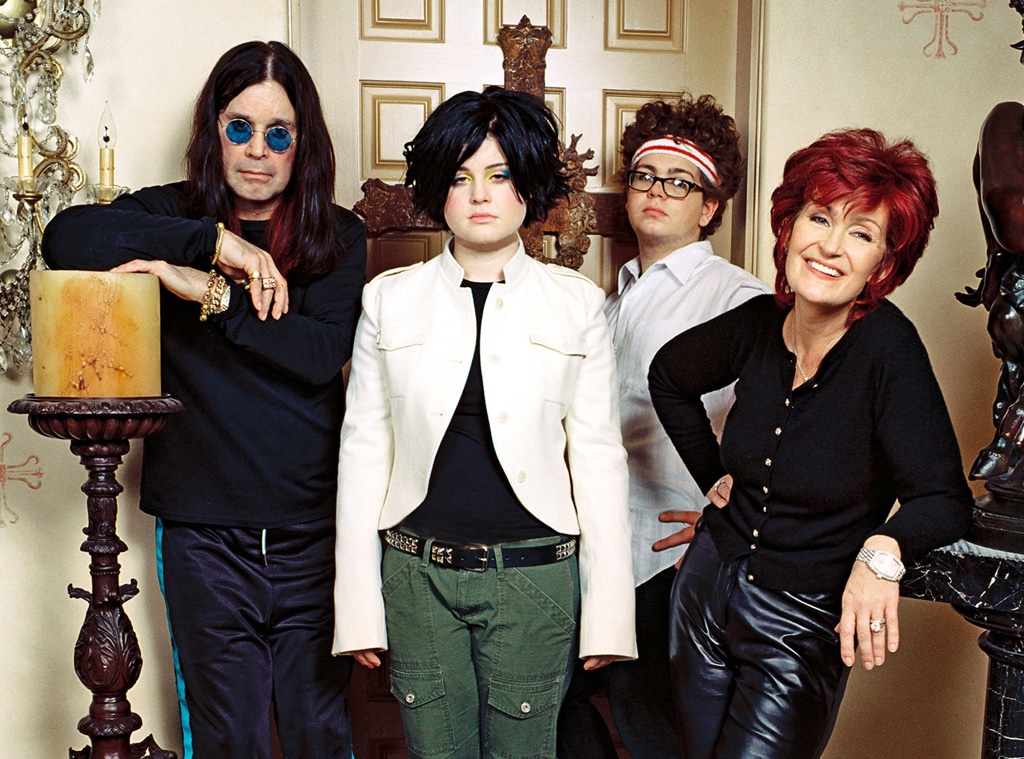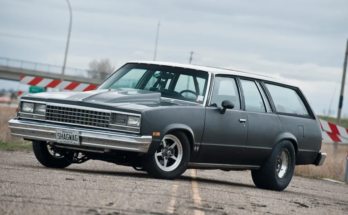In a dimly lit arena, Ozzy Osbourne, frail yet defiant, took the stage for his final performance in 2023, marking the end of a 50-year career. At 74, his voice trembled but carried the weight of a lifetime—decades of wild highs, crushing lows, and unyielding passion. The crowd, a sea of devoted fans, roared as he opened with “Crazy Train,” his anthem of chaos and resilience. Midway through, he paused, tears welling, and spoke hoarsely: “You’ve been my family, my strength, my madness. This ain’t goodbye—it’s ‘see you in the dark.’” The band slowed, and he sang “No More Tears,” each note a raw, aching farewell. As the final chord faded, Ozzy raised his fists, silhouetted against blinding lights, cementing his legacy as the Prince of Darkness—a flawed, fearless icon who lived for the music and the fans who carried him through. The silence that followed broke every heart in the room.

In 1996, Sharon launched Ozzfest, an annual heavy metal festival that showcased Osbourne’s solo work and Black Sabbath, alongside bands like Metallica, Slayer, and Pantera. Ozzfest became a cultural phenomenon, cementing Osbourne’s influence in the metal community. He reunited with Black Sabbath multiple times, including for the 1997 album The Ozzman Cometh and the 2013 album 13, which hit number one in the UK. Their final performance together was on July 5, 2025, at the “Back to the Beginning” concert in Birmingham, featuring the original lineup and guest appearances by Metallica, Guns N’ Roses, and others.
Notorious Antics and Public Persona
Osbourne’s “Prince of Darkness” persona was defined by his theatrical performances and infamous antics. In 1981, he bit the heads off two doves during a record label meeting, intending it as a peace gesture gone awry. In 1982, he bit the head off a dead bat during a concert in Des Moines, Iowa, mistakenly thinking it was a prop, leading to a rabies shot and a venue ban on live animals. His substance abuse led to bizarre behavior, such as snorting ants in a competition with Mötley Crüe, and darker moments, including a 1989 arrest for attempting to strangle Sharon while intoxicated. Sharon chose not to press charges, and Osbourne underwent six months of court-ordered rehabilitation.
Despite controversies, Osbourne’s charisma and raw energy endeared him to fans. His lyrics, often misinterpreted as satanic, addressed themes like war, depression, and addiction, reflecting his working-class roots and personal struggles. He refuted accusations of devil worship, emphasizing his role as an entertainer.

Reality TV and Cultural Impact
In the early 2000s, Osbourne reached a new audience through The Osbournes (2002–2005), a groundbreaking MTV reality show featuring him, Sharon, and their children Kelly and Jack (Aimee opted out). The show, which ran for 52 episodes over four seasons, portrayed Osbourne as a lovable, befuddled patriarch, contrasting his wild stage persona. It pioneered family-centric reality TV, influencing shows like Keeping Up with the Kardashians, and made the Osbournes household names. Osbourne also starred in Ozzy & Jack’s World Detour (2016–2018) and made cameo appearances on shows like South Park and CSI: Crime Scene Investigation.
Health Struggles and Final Years
Osbourne battled health issues, including a 2003 quad-biking accident that broke his collarbone, eight ribs, and a neck vertebra, requiring emergency surgery. In 2019, a fall exacerbated these injuries, and he was diagnosed with Parkinson’s disease (specifically PRKN 2 or Parkin 2) in 2020, which impacted his mobility but not his voice. Despite these challenges, he performed seated on a throne at his final concert on July 5, 2025, in Birmingham, delivering powerful renditions of “War Pigs,” “Iron Man,” and “Paranoid.”
Osbourne died on July 22, 2025, at age 76, in the UK, surrounded by his family. No official cause of death was disclosed, though his Parkinson’s and prior injuries likely contributed. His family, including Sharon, children Aimee, Kelly, Jack, Jessica, Louis, and adopted son Elliot, requested privacy.

Achievements
Black Sabbath: Co-founded the band, releasing seminal albums (Black Sabbath, Paranoid, Master of Reality) that defined heavy metal. Sold over 75 million albums and earned two Grammy Awards and a 2006 Rock and Roll Hall of Fame induction.
Solo Career: Released 13 studio albums, with the first seven multi-platinum in the US. Won five Grammy Awards and was inducted into the Rock and Roll Hall of Fame as a solo artist in 2024.
Ozzfest: Co-founded the influential metal festival in 1996, which toured globally and boosted the careers of numerous bands.
Awards and Honors: Received the Global Icon Award at the 2014 MTV Europe Music Awards, the Ivor Novello Award for Lifetime Achievement in 2015, and stars on the Hollywood Walk of Fame and Birmingham Walk of Stars. Inducted into the UK Music Hall of Fame with Black Sabbath and as a solo artist in 2005.
Cultural Impact: Pioneered reality TV with The Osbournes, influencing modern media, and achieved a UK number-one single with “Changes” (2003), a duet with Kelly, marking a 33-year gap from his first chart appearance.

Why Ozzy Osbourne Is an Iconic Singer
Ozzy Osbourne’s status as an iconic singer stems from his distinctive voice, theatrical persona, and enduring influence. His raw, haunting vocals gave Black Sabbath a unique sound, blending blues, horror, and industrial grit, which birthed heavy metal. Songs like “Paranoid” and “Crazy Train” remain anthems, with his voice described by Berklee professor Katherine Dacey as “immediately recognizable” and powerful.
Osbourne’s “Prince of Darkness” persona, marked by gothic imagery and shock tactics, made him a larger-than-life figure. Yet, his vulnerability—openly discussing addiction, dyslexia, and health struggles—humanized him, resonating with fans. The Osbournes revealed his softer side, showing a family man beneath the wild exterior, broadening his appeal.
His resilience, surviving decades of substance abuse, legal battles, and health issues, earned him the nickname “genetic mutant” for his ability to endure. Tributes from peers like Metallica, Elton John, and Billy Corgan highlight his influence, with Metallica crediting him for transforming their career. Fans, like Ellen Jeans, who cherished his vinyl records, and bands like Anthrax, who called heavy metal his “ultimate creation,” underscore his legacy.

Legacy and Remembrance After Death
Following Osbourne’s death, tributes poured in, reflecting his global impact. Black Sabbath’s X post, “Ozzy Forever,” and heartfelt words from peers like Sir Rod Stewart and Ronnie Wood emphasized his unique presence. Fans mourned the loss of a “cultural icon” who “reshaped music,” as noted by Hollywood Walk of Fame producer Ana Martinez. His final concert, set for theatrical release as Back to the Beginning: Ozzy’s Final Bow in 2026, captured his emotional farewell, drawing 45,000 fans in person and 5.8 million online.

Osbourne’s support for charities like Acorns Hospice during his final concert highlighted his generosity, ensuring his legacy endures beyond music. Parkinson’s UK praised his openness about his diagnosis, which normalized tough conversations for others. His music, antics, and authenticity continue to inspire, ensuring Ozzy Osbourne remains a beloved and unforgettable figure in rock history.


